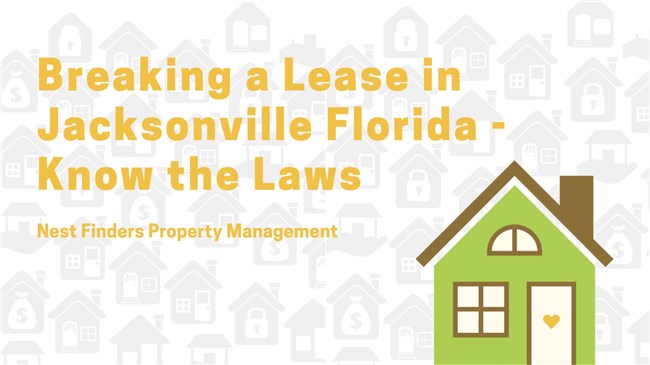As a landlord in Florida, it’s important to know statewide rules and regulations when it comes to tenants breaking a lease.
In this article, we will cover unjustified and justified reasons for early lease termination so that you will be well informed when it comes to your and your tenant's rights.
Rental Agreements in Florida
Lease Agreements
Having a clear Florida lease agreement is essential. When your tenant signs their lease, you, as the property owner and landlord, are responsible for making sure that they are aware of any penalties they will face when breaking a lease.
Your rental agreement should also include how much written notice a tenant must give you when ending their lease in Florida. In Florida, lease termination notice requirements vary based on the length of tenancy or lease period.
Tenants who submit their rent payment on a weekly basis are required to provide their landlord written notice seven days prior to the end of the week. Tenants who rent on a monthly basis should provide a 15-day notice before the end of the month.
Tenants who rent on a quarterly basis should provide a termination notice not less than 30 days before the end of the quarterly period. Additionally, annual renters in Florida are required to provide notice not less than 60 days before the end of any annual period in the lease term.
Subletting Agreements
A lease should also include information regarding whether your existing or new tenant can sublet their Florida rental unit.
In Florida, tenants may sublet the rental property unless you prohibit subletting in your rental agreement. If you want your tenants to seek your approval before subletting, you should include this clause in the rental lease.
To secure landlord approval, tenants should send a letter of request through certified mail, with a return receipt requested. This request should include the terms of the sublet lease agreement, as well as the following important information:
- Name of proposed assignee or subtenant
- Permanent home address of the proposed subtenant or assignee
- Your existing tenant’s reason for subletting or leaving permanently
- Written consent of any co-tenants living on the property
- Your existing tenant’s new address during the sublease
- A copy of the proposed sublease
Unless you state in the lease agreement that a sublease is not allowed, you can only reject the tenant’s sublet request or refuse the proposed subtenant if you have legitimate reasons to do so. According to Florida law, landlords cannot deny their tenant’s right to sublet without valid reasons related to the subtenant's rental history or ability to abide by any fixed term in the lease.
Unjustified Reasons for Breaking a Lease in Florida
The below reasons are not legally justified reasons for a Florida tenant to break a lease. If a tenant breaks the lease for these reasons, they have no legal protection against penalties related to not honoring the lease.
- The tenant purchased a house
- The tenant is moving to be closer to family
- The tenant wants to upgrade or downgrade
- The tenant is moving in with a partner
- The tenant is relocating for a new job or school
Breaking a lease in Florida for any of the above-listed reasons without court approval or in any conditions not previously outlined can have tangible consequences for tenants in Florida. If a tenant would like to break a lease for any of these reasons, the tenant should ask the landlord to agree to a mutual early termination.
Justified Reasons to Break a Lease in Florida
As a landlord in Florida, you must know the justified reasons for a tenant to break a lease early. Below, you will find justified reasons for early termination of a lease:
Early Termination Clause
Florida landlords can allow a tenant to terminate a lease earlier than the end of the lease term in exchange for paying a penalty fee.
For example, you may include in the lease terms that tenants can pre-terminate their lease or arrange a mutual termination before the end of the term, provided that they send a prior 15-day notice and pay an early termination fee equivalent to two months’ worth of rent.
Active Military Duty
Per the Servicemembers Civil Relief Act, Active service members in the armed forces or uniformed services who are relocated due to deployment or permanent change of station are allowed to legally break their lease. Service members are protected from penalties from the date they enter active military duty until 30 to 90 days after the date of discharge.
To justify breaking a lease in full accordance with the Relief Act, the following conditions must be met:
- The lease agreement must have been signed before entering active duty
- The active service member tenant should remain on active duty for at least 90 days
- The tenant must deliver a written notice to the landlord with a copy of the orders to deploy or a letter from their commanding officer stating the terms of their pending deployment
Violation of Florida Landlord Tenant Law or Lease Agreement
As a landlord in Florida, it’s important to familiarize yourself with Landlord-Tenant Law to avoid committing any accidental violations. In the event a landlord repeatedly violates legal processes or standards, it may be enough to justify the tenant breaking the lease early with no penalties.
Per Florida laws, a few examples of these kinds of violations include:
- The rental units do not meet the habitable housing standards and safety codes as stated by state or federal law
- The landlord violates the privacy of a tenant by not giving at least 12-hour proper notice prior to entry in a non-emergency situation
- The landlord changes the locks or locks out their tenant
- The landlord removes doors or windows on the property
- The landlord cuts off utility services
Other Reasons for Lease Breaking
Florida tenants may legally break their lease early for other reasons according to Florida statutes, such as:
- If they are a victim of domestic violence
- If they are a senior citizen with health issues
- If they signed an illegal or unenforceable contract
- If the landlord did not provide mandatory disclosures
Re-Renting Policies
Under Florida law, there is no statute that requires landlords to make a reasonable effort to re-rent the unit immediately. As a landlord in Florida, you are not required to take reasonable steps to find a new Florida renter for your rental unit as soon as tenants break their lease.
This means your tenants may have to pay out the remaining rent for the rest of their lease agreement depending on the terms in the lease agreement.
Bottom Line
We hope this article helped you better understand how Landlord-Tenant Laws impact breaking a lease in Florida! If you have any further questions, please reach out to Nest Finders Property Management today.
We are a leading property management company in Jacksonville, and our team has decades of collective experience working with landlords like you! Contact us today at (904) 565-9040 to learn more about our comprehensive services.



